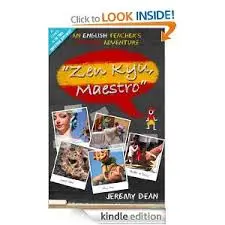When “Jeremy José Dean” contacted me about reading and reviewing his book “Zen Kyu Maestro,” I wasn’t sure at first. I had visions of a Buddhist self-help book (“The Tao of Pooh” –anyone remember that?) and wasn’t keen. But I accepted, and was soooooo glad I did! In actual fact, “Zen Kyu Maestro” is a very clever title for Dean’s book (not his real name – will we ever know who he is?). Dean featured on my League of Expat Writers. He is a teacher ‘somewhere’ in the depths of traditional Spain. He won’t say where…probably to protect his identity & integrity as a teacher, and maybe to prevent an influx of tourists? He likes traditional Spain just fine thanks.
As a teacher myself, I jumped at the chance to interview him.
Jeremy commented in his book:
Learning a new language (and teaching my own as a foreign one) has [taught] me things about my mother tongue that I’d never noticed before.
I could relate! I knew I’d like reading this, and I wasn’t disappointed.
Copy of book provided free of charge by the author for review.
Jeremy, thanks so much for agreeing to this interview. As an English teacher myself and having taught in the depths of Greece and been almost the ‘only foreigner,’ I found myself laughing aloud in places in your book. I enjoyed it very much and am looking forward to hearing more from you.
What on earth possessed you & your wife to leave a ‘safe’ teaching job in Norfolk, the UK and move to a remote part of Spain?
The move to Spain was just a ‘right time of life’ decision. My wife and I have always loved travelling, and we’ve long suspected that you only ever scrape the surface of a country as a tourist. We did spend some time teaching in Kuwait and Japan when we were much younger, and these experiences confirmed that suspicion. After the death of our parents we thought the time was right to try it on a more long-term basis. We’d been reasonably successful primary teachers, didn’t hate the job or the country, we just fancied a change? a new culture? better weather? As a wise old car mechanic once said to me, ‘Life isn’t a dress rehearsal.’
Spain as a destination had always been the obvious choice for us. Not too far away— but reasonably foreign (if we could stay away from the ‘Costas’, which we did). We’d seen a fair bit of the country as tourists and really liked it; the food, the people, the life in the streets, especially when there’s a fiesta on. Spain is a surprisingly diverse country; beaches, mountains, unspoilt villages, modern cities. The opportunity to learn the language was a major draw, but the reason we ended up in this particular non Costa, non English-speaking enclave was pure luck. This was where the school which we got jobs in (luckily) happened to be.

I can relate in a way, because I left a ‘safe’ existence in the UK to come to Greece, right at the start of the ‘crisis.’
It’s interesting you note that any other nationality in Spain is considered a foreigner, but if you’re a ‘Brit,’ you’re an expat. Can you explain that a little further…why do you think this is?
I think it’s only us ‘Brits’ who class ourselves as ‘expats’ (as opposed to ‘foreigners’) when we move abroad. I’ve heard British expats complaining about the amount of ‘foreigners’ coming into Spain, as if they themselves somehow didn’t count. And I once heard a large crowd of expat Brits bemoaning the number of foreigners back in the UK, ‘all eating their own food, speaking their own languages and living close to each other.’ And where did I hear this complaint? In a ‘British’ pub in Marbella serving fish’n’chips and Sunday roasts to the (large, resident) expat community. The comment was, of course, made in English. It’s quite bizarre.
You’ve been to other countries and mention the expat scene in Kuwait, for example. It’s not for you, as you highlight. Again, I can relate as the expat scene in Cairo was not for me either.
Why do you think the European expat scene differs and is better? Is it because there’s more of a chance, maybe, (if you’re willing), for one to try to integrate into local culture ? Did you ever make any Kuwaiti friends?
The thing about the ‘expat’ scene is that it can be very different wherever you go. In Kuwait the (British) expat scene which I witnessed centred on home-brewing (alcohol was illegal) and partying. It was difficult to make Kuwaiti friends, mainly because of the language barrier, but we did make friends with an Egyptian family whose daughter was in my wife’s class. We were only there for a year, so maybe it would have improved had we stayed longer.
I’m not sure I’d say the European expat scene is better per se, although we’ve much preferred living here. Some teachers in Kuwait loved the life there. And, to be honest, I can’t say very much about any expat scene here, as there isn’t really much of one, there are so few (British) foreigners in this part of Spain. The fact that we’ve managed to learn some Spanish has helped us to make some Spanish friends however, although I’ve read (and I think it’s true) that it’s quite difficult to break into some Spanish circles as family ties are so strong.
We’ve quite a high turnover of British staff at the school, so in the seven years we’ve been here different groups of staff have ‘got on’ (or not) in different ways. For a while there was quite a large group of youngish females who did a lot of ‘going out’ together. At the moment we’ve got another pretty large influx of newer staff and it’s not yet clear what sort of a social scene will develop. Linda and I have built up a mix of friends over the years we’ve been here; Spanish, Rumanian and British, but to be honest, our main ‘social’ activity is sitting in a quiet bar together watching the world go by.
You mention the café culture of Spain and how you and your wife have adapted well to it…me too in Greece! I know I love the slow, no rush to buy another and move on. I also love the civilised drinking, not the ‘drink to get drunk’ culture.
Now about the kids. You have a lovely dry sense of humour, and a great way with words that enables the reader to picture themselves in the classroom, listening to kids speak literally (anyone guessed what “Zen Kyu Maestro” could be yet?).
At first, it’s crazy to imagine that anyone’d want to send their child to an Immersion School (a school where all lessons are taught in a foreign language, so in this case, Spanish children were being taught totally in English).
You note that the parents seem to be attracted to the “famous old British traits of politeness, good manners…and discipline.” (I find this in Greece too). How do you think this differs from Spanish schools then? Don’t they have discipline?
That’s a difficult one, as we can only repeat what we hear from the parents who have decided to pay to send their children to us. While the majority cite positive reasons for coming here (mentioned above) as well as a desire for their children to be bilingual, we do hear complaints that some ‘local’ schools are not up to scratch. Having said that, anyone who works in the ‘private school’ sector outside the UK will know it’s not always true that ‘you get what you pay for’. Similarly, there are schools in the UK which people pay to avoid.
Bearing that in mind, I’m often amused when I hear parents praise us for our politeness, good manners and especially discipline. Whenever I hear this, I thank heavens that British newspapers (full of their horror-stories about the state of UK schools) are pretty much unavailable here. If the parents only heard what we say about the state of our education system at home, they might not be so ready to trust us to be doing things well. But having said that, the Spanish press do a fair bit of ‘school bashing’ themselves, so maybe that explains why some parents want to get out of the Spanish system.
And no, to my knowledge, nobody has cracked the Zen Kyu Maestro code before the end of the book. But I’m sure someone who has lived in Spain soon will.
I find Greek attitudes to kids differ vastly from British attitudes. Kids are very much the centre of society, not a ‘seen and not heard’ mentality. Kids can be in restaurants until midnight; running around the town square; the centre of attention.
Do you think this alters the concept of discipline?
That’s such a difficult question. I often ponder exactly what is the ‘culture’ regarding children here. We live overlooking a large ‘parque’ which is playground to all the children who live in the surrounding blocks and then some. After school the park fills rapidly with footballers, bike-riders, skaters of all descriptions (except ice), skippers, insect-collectors… even tree-climbers! A little later the surrounding cafés fill with their parents, grandparents, tíos and tías (and us). This is spectacular ‘people-watching’ time and terrain, but it’s not easy to come to any decisive conclusions. It certainly seems (to my British eyes) that the children are running riot. As I said, they’re swinging from the trees, footballs bash into the parked cars, camareros are nearly mown down by groups of six-year-olds hurtling along the pavement on pink cycles fitted with noisy stabilisers… And all the while their parents and friends chat and joke and drink cafés and cañas. Deep inside I love it, and despite all the apparent chaos there does seem to be some sort of discipline.
We’ve never seen a ‘fight’. (We’ve been here nearly eight years.) This is true in school as well, with one exception (in secondary), and that was more of a tussle than what I’d term a real (blows landed) scrap. In my last school in the UK there was at least one real set-to in the playground every couple of weeks. But again, my last school in the UK wasn’t typical, and neither is my school here typical of Spain. This is why generalisations are so difficult. All I can really say is; I love what I see here, (especially the tree climbing!)
One other aspect I’ll mention is the care taken of younger childrenby older ones: you see this all the time. Sweaty footballers stopping to pick up a tot who’s run their trike off the path and tumbled onto the ‘pitch’; groups of teenagers splitting to make way for the marauding pink cycle gang without breaking the flow of their conversation; large children climbing trees to rescue balls for very small children. There’s so much ‘live and let live’.
Yes, I will have another café con leche.

And lastly, I take it you’ve stayed in Spain. How’s your Spanish coming along? Still facing challenges with the bureaucratic processes?
My Spanish continues to develop at a slower pace than the children in my class improve their English. (I guess I could take a brownie point for being a great teacher… and a hundred lines for being a poor student!) After the initial shock of not being fluent after the first year, we’re resigned to slow (but hopefully inexorable) progress.
As for the bureaucracy, that’s much easier once you’ve been through the first year (and learned a bit more of the lingo). Spain certainly has its faults (like the bureaucracy), and it’s going through a very hard economic period, but it’s still a great country with vibrant fiestas, fabulous food, a wonderful café culture… and the craziest schoolchildren you’re ever likely to meet.
¡Un Saludo!
Jeremy.
Thanks for taking the time to answer my questions. I would really recommend “Zen Kyu Maestro” to everybody, not only the teachers among us…to anyone who’s ever moved abroad for any length of time and can laugh and nod along with the frustrations examined in Jeremy’s book.
You can follow Jeremy Jose Dean on Facebook where his jeremyinspain profile charts his life (as an expat), while the zenkyumaestro page deals with news and background about the book with sneak previews of the sequel (working title is Zenky 2). He’s also on Twitter @JeremyJoseDean and blogs at zenkyumaestro.blogspot.com.es/ (life in Spain) and spain4primary.blogspot.com.es/ (resources for primary MFL Spanish teachers).
Featured image courtesy of www.amazon.co.uk

